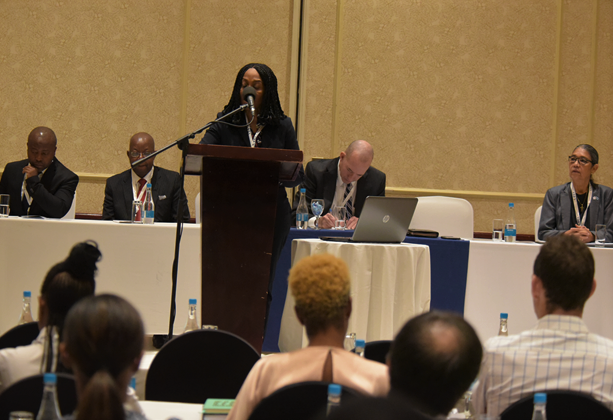The African Export-Import Bank (Afreximbank) has made the case for factoring as a viable and sustainable solution to address the challenge of access to financing which is hindering the growth of Africa’s small and medium-scale enterprises (SMEs).
Kanayo Awani, Managing Director of the Intra-African Trade Initiative at Afreximbank, said on 12 March during a factoring promotion conference held in Gaborone that factoring, a form of trade finance provided a solution to address the SME financing gap and would help innovative SMEs to grow and support Africa’s structural transformation and trade development.
Ms. Awani, who noted that access to appropriate and affordable finance had been frequently cited as a major obstacle for SMEs, explained that factoring was an important alternative to other trade financing sources, such as bank loans.
Despite its huge opportunities, however, factoring had not yet taken off fully in Africa, with the region accounting for less than 1 per cent of global factoring volumes in 2017, stated Ms. Awani.
Notwithstanding that, the region had demonstrated strong growth in recent years, with factoring volumes growing from Euro 14.9 billion in 2009 to approximately Euro 22.3 billion in 2017, although most of those volumes were concentrated in South Africa, Tunisia, Morocco, Egypt, Mauritius and Kenya.
She said that Africa’s factoring volumes were projected to reach about Euro 200 billion by 2021, resulting mostly from new market entrants supported by the sustained economic growth; rapid rise of Africa’s middle class.
Also is emergence of innovative industries supported by technological advancements; rapidly expanding trade and economic relations between Africa and major economies in the South; and increasing focus on regional integration and intra-regional trade under the African Continental Free Trade Agreement.
Afreximbank had been playing a leading role in facilitating the growth of factoring in Africa through various interventions, including supporting the creation of a facilitative legal and regulatory environment for factoring; provision of finance and guarantees to factoring companies; provision of technical assistance; and formation of strategic partnerships to promote the development of factoring.
The two-day Factoring Promotion Conference held under the theme “Domestic and International Factoring: Alternative tools for SME financing in Africa” on 12 and 13 March, was organized by Afreximbank and FCI, the global representative body for factoring and financing of open account domestic and international trade receivables.
It had over 180 attendees and provided practical information and ideas about how to set up factoring activities and highlighted the importance of factoring in the development and promotion of SME financing. Topics covered included benefits and risks of factoring, mechanics of factoring, and legal aspects of factoring.
It also provided networking opportunities for African factors, bankers, lawyers and others.
The speakers included Emma Peloetletse, Accountant General of Botswana, Elaina Gonsalves, Deputy Secretary for Financial Policy of Botswana, and Peter Mulroy, Secretary General of FCI.
Ms. Awani is also Chairperson of the Africa Chapter of FCI.
Kanayo Awani, Managing Director of the Intra-African Trade Initiative at Afreximbank, said on 12 March during a factoring promotion conference held in Gaborone that factoring, a form of trade finance provided a solution to address the SME financing gap and would help innovative SMEs to grow and support Africa’s structural transformation and trade development.
Ms. Awani, who noted that access to appropriate and affordable finance had been frequently cited as a major obstacle for SMEs, explained that factoring was an important alternative to other trade financing sources, such as bank loans.
Despite its huge opportunities, however, factoring had not yet taken off fully in Africa, with the region accounting for less than 1 per cent of global factoring volumes in 2017, stated Ms. Awani. Notwithstanding that, the region had demonstrated strong growth in recent years, with factoring volumes growing from Euro 14.9 billion in 2009 to approximately Euro 22.3 billion in 2017, although most of those volumes were concentrated in South Africa, Tunisia, Morocco, Egypt, Mauritius and Kenya.
She said that Africa’s factoring volumes were projected to reach about Euro 200 billion by 2021, resulting mostly from new market entrants supported by the sustained economic growth; rapid rise of Africa’s middle class; emergence of innovative industries supported by technological advancements; rapidly expanding trade and economic relations between Africa and major economies in the South; and increasing focus on regional integration and intra-regional trade under the African Continental Free Trade Agreement.
Afreximbank had been playing a leading role in facilitating the growth of factoring in Africa through various interventions, including supporting the creation of a facilitative legal and regulatory environment for factoring; provision of finance and guarantees to factoring companies; provision of technical assistance; and formation of strategic partnerships to promote the development of factoring.
The two-day Factoring Promotion Conference held under the theme “Domestic and International Factoring: Alternative tools for SME financing in Africa” on 12 and 13 March, was organized by Afreximbank and FCI, the global representative body for factoring and financing of open account domestic and international trade receivables.
It had over 180 attendees and provided practical information and ideas about how to set up factoring activities and highlighted the importance of factoring in the development and promotion of SME financing. Topics covered included benefits and risks of factoring, mechanics of factoring, and legal aspects of factoring. It also provided networking opportunities for African factors, bankers, lawyers and others.
The speakers included Emma Peloetletse, Accountant General of Botswana, Elaina Gonsalves, Deputy Secretary for Financial Policy of Botswana, and Peter Mulroy, Secretary General of FCI.
Ms. Awani is also Chairperson of the Africa Chapter of FCI.
Source




